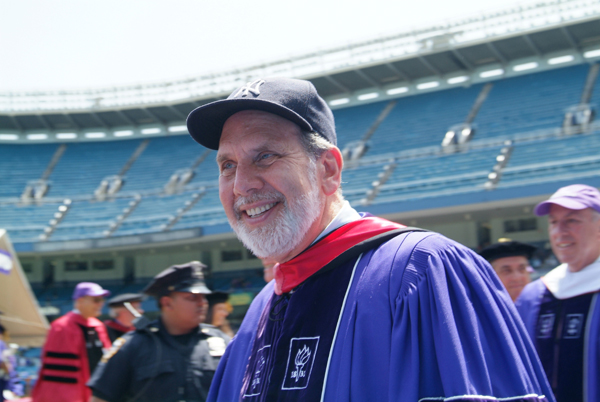
John Sexton has been at the helm of New York University for almost 14 years (photoshootnyc/FlickrCC).
New York University offers one of this country's most expensive four-year degrees, and it's only getting more expensive. Between 2008 and 2012, the average price students were paying increased by 12 percent for families making over $110,000 a year, and by 39 percent for families making under $30,000.
John Sexton has been president of NYU for over a decade. During that time, the university's real-estate footprint has grown by two million square feet and it's launched 11 international academic centers. Sexton has faced significant criticism for the direction he's taken the school, and for rising costs. Earlier this year he announced he'll step down in 2016.
CARAPEZZA: What's been the greatest challenge as a university president?
SEXTON: The greatest challenge to me is providing a safe environment for our students no matter where we send them in the world, even as we promise and commit ourselves to getting them out of their comfort zones. So there's a tension between those two things and I have to say we worry about it all the time, I wake up at nights with it.
CARAPEZZA: I imagine it must be overwhelming to run a university with so many stakeholders, it's not an easy job. Can you point to one moment when you thought 'I need to resign.'
SEXTON: There's never been a moment where I've felt badly about what was going on. Difficulties, challenges, always -- but that's what part of what makes life interesting.
CARAPEZZA: What about controversies? To name a few: five non-binding faculty votes of no-confidence in your leadership, you've significantly expanded NYU's real-estate and academic presence overseas. At the same time, faculty have fiercely opposed those moves, saying you're driving up costs. How do you respond to your critics?
SEXTON: The facts are 14 years as dean with complete and utter support... and then in a 14-year presidency more than a decade without any controversy... except for one moment over graduate student unionization which ended up with our university supporting what the administration wanted. You made reference to certain things that have been in the media, they're very much out of context. Hundreds of faculty from NYU have been involved in our globalization of the university. And you'll probably not find more than one or two who aren't extremely enthusiastic about it. The resistance seems to come primarily from people who either aren't involved, or who have been told that they weren't appropriate to be involved. No-confidence votes -- this is a motif in higher education these days. For people to express dissatisfaction with their circumstances is not unique to NYU. It's tough to be a university president these days.
CARAPEZZA: Do you think NYU fully understands the cost of the education that you offer?
SEXTON: Our annual budget is about 7 billion and the rating agencies come in and one of the things they remark on is how well we understand our cost and all the elements. The conversation that's going on now nationally around the cost of higher education is a reflection, in large part, of the transformation of higher education from being a public good into it being a private good.
But the fact of the matter is that bottom line, in most matters, the amount you invest determines the quality of what you get. I live in a city where the people with all the choices, all the money, all the information, kill to get their kids into $35,000 kindergartens. I don't think it's surprising that a university education costs $50,000. Quality costs.
CARAPEZZA: Still, at a time of budget cuts and rising costs you've launched academic campuses in 11 international cities, from Tel Aviv to Abu Dubai to Shanghai. how successful are these branch campuses?
SEXTON: Every single one of our overseas campuses, that are part of the network, contribute resources to NYU in New York. So if you want to view education as an economic matter and nothing but that, which I distinctly do not, but if you want to view it that way this is a positive sum game for the New York campus. It helps us broaden our offerings and financial aid in New York because we have the global network university.
CARAPEZZA: Looking overseas, do you really think colleges and universities can standardize the skills that are now required to succeed in an increasingly global economy?
SEXTON: I don't want to be part of a college or university that standardizes skills. I want to meet the individual student where he or she is and I want to maximize his or her dreams and passions and capacities to fulfill them.










